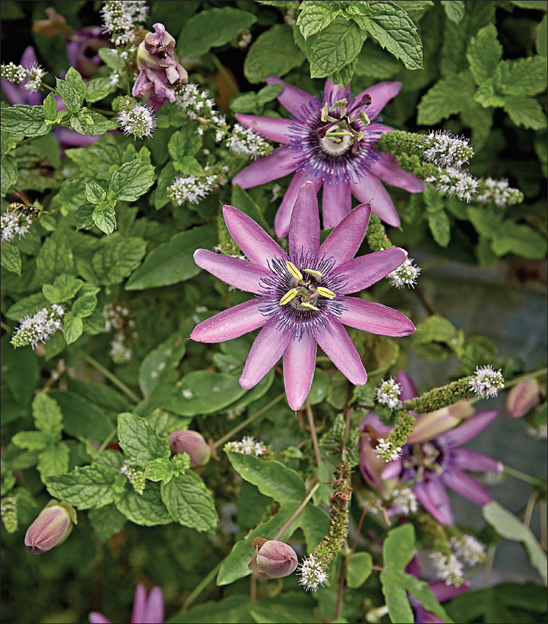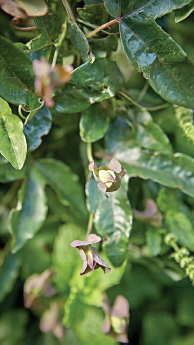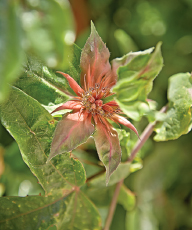
Passionflower
This incredible, eye-catching plant features a purple starburst flower that resembles a floral firework. Unfortunately, these showy flowers only last 24 hours—but the stress-busting power of passionflower extract lasts much longer. There are hundreds of Passiflora species, but the one most popular for medicinal use is P. incarnata, also called the purple passionflower, true passionflower, or maypop. While many passionflowers are tropical plants, this fast-growing vine grows wild in many parts of the southeastern United States.
 Health Benefits
Health Benefits
Passionflower is most commonly used to treat conditions associated with nervousness, restlessness, anxiety, irritability, and insomnia due to stress and tension. Many clinical trials have looked at the anti-anxiety effect of passionflower, especially when combined with other herbs with similar effects. It is known to have sedative, analgesic, and antispasmodic properties. It is particularly helpful for those who feel weak and exhausted from stress—North America’s number 1 silent killer.
Passionflower is a mild sedative that doesn’t cause the same “hangover” side effects most pharmaceutical drugs do. If you suffer from anxiety, doctors commonly prescribe a drug called benzodiazapine. In a study comparing the two remedies, passionflower extract seems to work at least as well and also didn’t cause impairment of work like benzodiazapine did. If you regularly have trouble falling asleep—another issue that impacts workplace performance—passionflower is the herb to take before bed.
Due to its antispasmodic properties, this herb is also an excellent remedy to counter cramps, spasms, menstrual pain, PMS, and asthma. It may also help those with nerve pain as a result of shingles.
DIFFICULTY
Easy to medium
HARDINESS
Perennial in zones 6 and above
TIME TO PLANT
Spring
TIME TO HARVEST
Summer
LOCATION
Full to part sun
SOIL TYPE
Moist, well-drained
 Growing
Growing
Passionflower is a sexy plant. Yes, I said it: sexy. This flowering vine grows quickly and produces unique purple blossoms. The flowers appear alien-like but extremely attractive at the same time. I call them both exotic and erotic! Passionflower grows beautifully in the garden or in a pot, and I’ve used it several times as a focal point and a trailer in mixed containers. Passionflower is a perennial, but it won’t survive most Canadian winters, so it should be enjoyed outdoors in the summer but brought inside before frost threatens.
Common Varieties: There are over 400 passionflower species, including some with edible fruit. Passiflora incarnata is the plant of choice if you’re using it medicinally.
PLANT
Passionflower is easily propagated by stem cuttings and can be sown from seed, but I recommend purchasing transplants. Passionflower isn’t always readily available, but you should be able to find it occasionally at larger garden centres, home improvement stores, and perhaps even flower shops.
Plant passionflower in direct sun—it thrives in locations with heat, humidity, and adequate moisture. Ensure you have rich soil that will maintain moisture but also has good drainage. I find passionflower grows best when planted in containers with potting soil.
Water often until the plant is established.
GROW
Cool summers are passionflower’s biggest enemy. This plant loves the heat and likes it humid. Passionflower also enjoys moisture and requires regular watering, especially when grown in a container. Water deeply in the morning for great results, but don’t overdo it. If the leaves start to yellow, allow the plant to dry out between waterings.
This fast-growing vine is self-clinging, but I recommend using a support system like a trellis, bamboo stake, obelisk, or tomato cage to guide the growth. Staking improves airflow around the plant and minimizes the chances of disease. Tie the vine with a material that will not cut into the stem, such as nylon stockings or plastic twist-ties.
Passionflower enjoys compost-rich soils and will benefit from fertilizing when planted in a container. Feed these sexy vines at least twice per month with a general-purpose fertilizer (20-20-20), compost tea, or fish emulsion.
“Vertical gardening” is about growing up instead of growing out. This style of gardening lends itself to small spaces, as its footprint is minimal. Passionflower—which is really a vine—is a perfect addition to a vertical garden, and it can provide privacy when supported by a trellis on the patio.

To stimulate growth and improve overall health, deadhead the spent flowers and occasionally prune or pinch back the side shoots if they appear a little out of control. Never fear, as passionflower is a tough vine and can take a good battle with the pruners!
Bugs to watch for include whiteflies, aphids, scale, and spider mites. Apply insecticidal soap every 3 weeks as a preventive.
HARVEST
The leaves, flowers, and fruits of Passiflora incarnata are edible. Harvest the flowers by removing them (stem included) when they’re fully open mid-morning to early afternoon. Harvest the fruit in late summer. Allow it to vine-ripen, and look for full orange colour and plump appearance before you pick it. (Note that the fruits of other passionflower species may not be edible.)
STORE
Stems, leaves, and flowers should be hung to dry by placing out of direct light in a dry, warm location. Drying should take 7 to 10 days. To dry the blossoms separately, cut the flower cleanly at the base of the stem and place on a clean, dry, paper-lined surface for one week.
Fruits should be eaten fresh and can be refrigerated for up to 10 days.



An immature passionflower bloom; full bloom; dried passionflower.
 Put It to Work
Put It to Work
Problems sleeping? Drink this nightcap!
Measure 1 cup of dried passionflower blossoms and place them in a resealable glass jar (like a Mason jar). Pour vodka (at least 80 proof) into the jar until it covers the flowers by at least 2.5 cm (1 inch). Place wax paper over the jar and then screw the lid on tightly to seal it. Set aside in a cool, dark place for 1 month, shaking the jar once daily.
After a month, place cheesecloth or a swatch of linen or muslin over the mouth of a sterile jar and pour the herb-infused liquid through the cloth, straining the liquid as it enters the jar. Discard solids.
Take 1 teaspoon up to 3 times daily. The infusion will keep indefinitely stored in a cool, dark place.
Workplace stress? Drink passionflower coffee!
OK, I won’t ask you to stop drinking coffee! If I did, I would be a hypocrite, since I won’t give it up myself. And I’d be asking you to ignore the health virtues that come with coffee in moderation—and there are many. But coffee drinkers may experience the jitters after having more than 2 or 3 cups a day. One way to counter the effects and experience a more restful day is to power your coffee with passionflower!
Brew your coffee as you normally would, and make it extra hot. Dunk in a tablespoon of dried passionflower blooms. Cover and steep for 10 minutes. Strain out the flowers and enjoy!
Overly excitable? Try passionflower juice!
Inability to concentrate is usually related to an overly stimulated nervous system. Due to its ability to relax the nervous system, passionflower has been considered for the relief of attention deficit hyperactivity disorder (ADHD) symptoms. It’s even safe for children.
To make passionflower juice, first make a passionflower infusion by placing 1 tablespoon of dried passionflower herb (leaves and flowers) in 1 cup of boiling water. Let the mixture steep for 15 minutes. Cool and add 1 cup of complementary juice, such as grape, strawberry, blueberry, or pomegranate juice. Shake well. Let us know what the teacher says about your child’s behaviour after lunch!
 Fast Forward
Fast Forward
Fast forward to the health food store to purchase St. Francis passionflower tincture or equivalent. Follow the instructions on the label.
 Cautions
Cautions
Avoid driving or operating heavy machinery while taking passionflower, as it has sedative effects. You should also avoid combining passionflower with other sedatives that might increase the risk of excessive drowsiness, such as pentobarbital (Nembutal), pheno-barbital (Luminal), secobarbital (Seconal), clonazepam (Klonopin), lorazepam (Ativan), and zolpidem (Ambien).
Avoid if allergic to passionflower or any of its constituents.
If you experience low blood pressure or are pregnant or breastfeeding, avoid use.